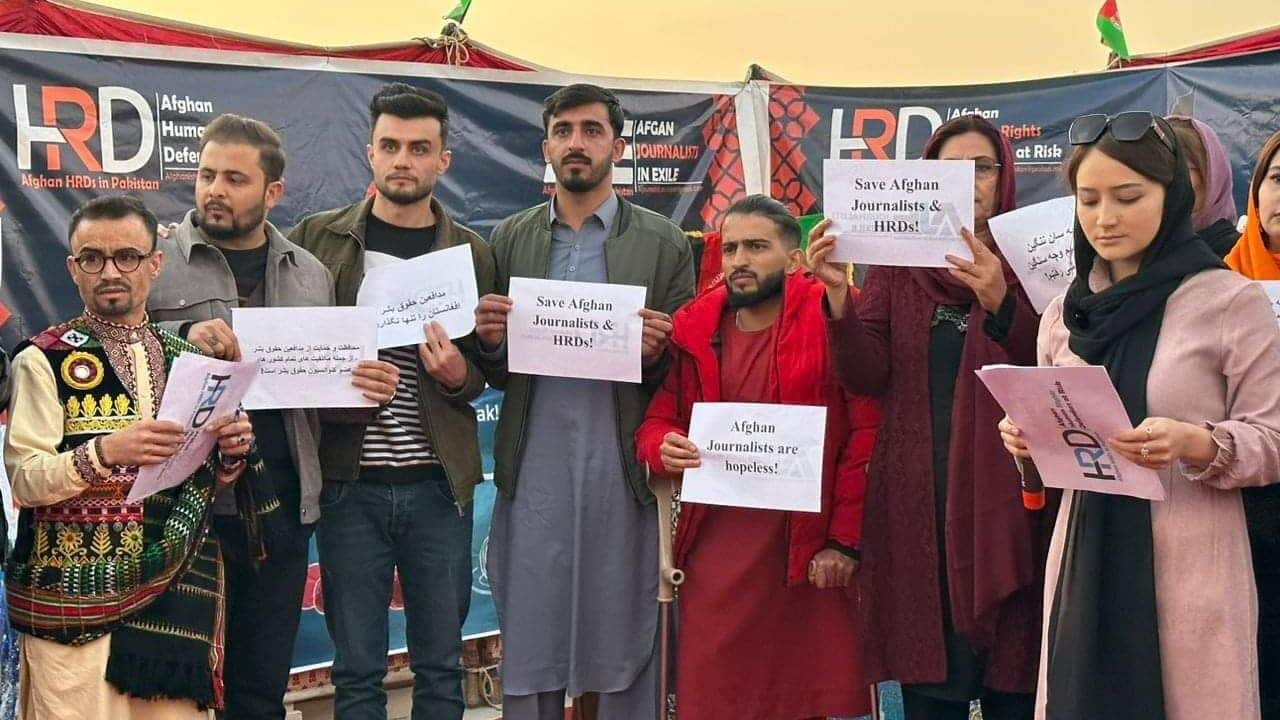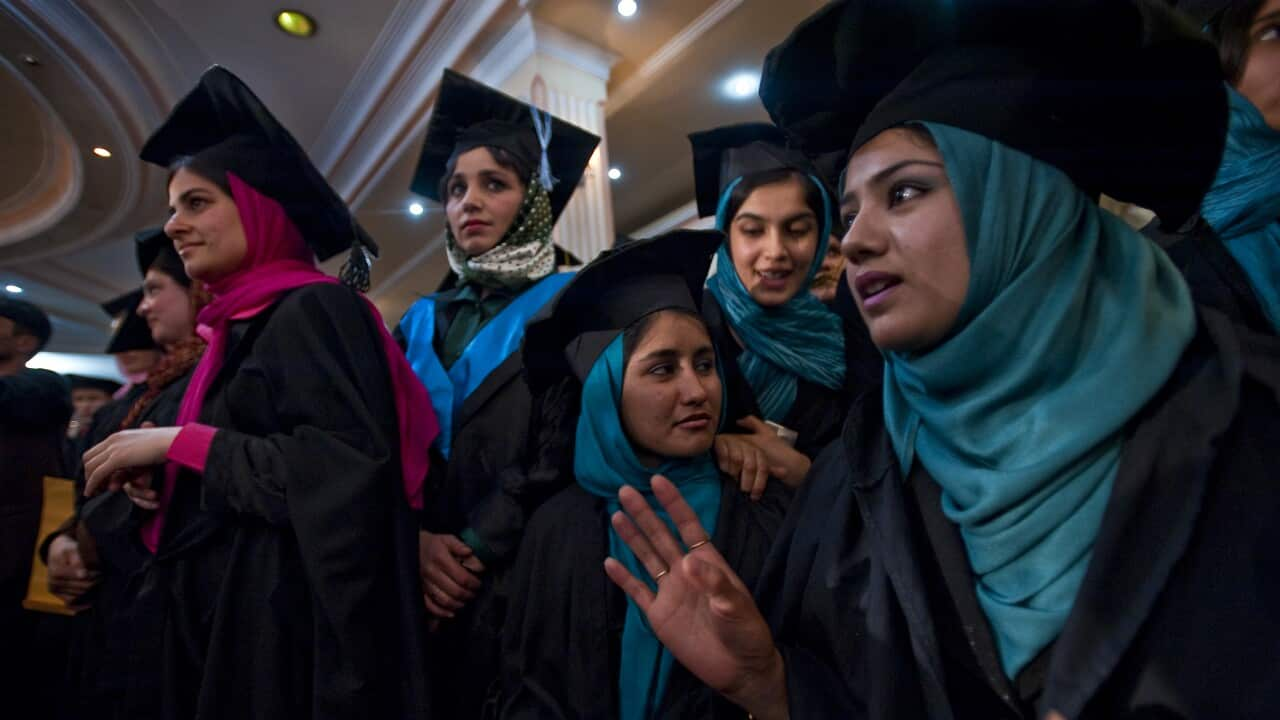Key Points
- Dozens of Afghan journalists are living in exile while waiting for their Australian humanitarian visas to be processed.
- Since the Taliban takeover of Afghanistan in 2021, hundreds of media outlets have closed.
- There are calls for the Australian government to raise its refugee and humanitarian intake.
A report by has found that since the Taliban seized control of Afghanistan in August 2021, hundreds of media outlets have closed and thousands of media workers, especially women, have lost their jobs.
The Taliban’s restriction on the freedom of media has forced many in the industry to leave the country in search of safe haven.
While the Australian government has allocated 31,500 permanent visa places for Afghan citizens from 2021 to 2026, media workers and civil activists have told SBS Pashto that the processing time is leaving many in uncertain and dangerous situations in neighbouring Pakistan.
‘Threats before return to power’
Gulabzoi Ahmadzai is an Afghan journalist who worked with local media organisations for 14 years.
After receiving numerous threats from the Taliban before the group returned to power, he "had no choice" but to flee the country after August 2021.
"I was threatened by the Taliban when Afghanistan was a republic, and then when they arrived [in Kabul], I no longer felt safe because I was identifiable and many citizens knew me, I was at risk," he said.
“At the start, my family members received visas [to go to] Pakistan, and I sent them here. However, I was unable to obtain a visa myself. After one and a half months, I was finally able to obtain a visa and I also came to Islamabad.”

Gulabzoi Ahmadzai (right) during an interview with the founder of Maryam University, Shahla Rasheed in Kabul. Credit: Supplied
He received an acknowledgement letter but has not heard anything since.
“Our visas [in Pakistan] have expired and it is very difficult to extend them. It’s very expensive here in Pakistan and it’s hard for us to live here without any job and other income.
“In Afghanistan, journalists are among the people who are in danger, not only themselves but also their families.
“I kindly request the Australian government to look into the current situation and evacuate us as soon as possible so we can have safety and security in Australia.”
'The process is very slow'
Farzana Ayubi is a journalist and women's rights activist who worked with various media outlets in Afghanistan for approximately seven years.
After the Taliban entered Kabul, she remained in Afghanistan to advocate for the rights of women and Afghan media workers.
However, she faced threats and chose to flee the country as the Taliban "crushed" the media in the country.

Farzana Ayubi (centre) Credit: Supplied
“I have been in Pakistan for nearly two years, and we have seen many problems in Pakistan as well. The main problems of Afghans here are the visa and threat of arrest by the police. I have been stopped here several times by the police.
It has been almost a year and a half since we applied for an Australian humanitarian visa but we have only received our case number. The process is very slow, and we have not received any further updates. We are still waiting.Farzana Ayubi, Afghan journalist and women's rights activist
Since the fall of Kabul, close to 11,500 Australian permanent humanitarian visas have been granted to Afghan citizens, and there were more than 168,000 Afghan citizens with a Class XB Refugee and Humanitarian visa application on hand, according to the Department of Home Affairs.
“The Australian government is committed to supporting the Afghan community, with 16,500 places allocated for Afghan nationals under the Humanitarian Program, delivered over the next four years (4,125 places per year between 2022/23 – 2025/26)," a Home Affairs spokesperson said.
"Australia’s Humanitarian Program intake has been drawn from a range of nationalities, ethnic and religious groups, reflecting global displacement arising from conflict and persecution. The Program operates flexibly to respond effectively to evolving humanitarian emergencies, such as Afghanistan, and global resettlement needs."
The spokesperson added that within the program places for Afghan nationals, priority is being given to certified former Locally Engaged Employees (LEE) and their immediate family members; immediate family members of holders of Refugee and Humanitarian (Class XB) visas; refugees who have been referred by the United Nations High Commissioner for Refugees (UNHCR) to Australia for resettlement; and women and girls, ethnic minorities, LGBTQI+ and other identified minority groups.
‘Dozens of journalists waiting’
Jahanzeb Wesa was a radio host in the southern province of Uruzgan. In September 2021 he participated in a demonstration with other journalists and civil activists, and subsequently became a target for the Taliban.
Mr Jahanzeb is currently residing in Pakistan and is urging the Australian government to prioritise the humanitarian visa applications of Afghan journalists and civil activists.

Jahanzeb Wesa Credit: Supplied
“I also sustained an injury to my hand. After this incident, I decided with other colleagues to leave Afghanistan.
Numerous Afghan journalists, myself included, have received case numbers after submitting our applications for Australian humanitarian visas, but we have not received any further updates since then.Jahanzeb Wesa, Afghan radio host
"We urge the Australian government to expedite the process and relocate all Afghan journalists to Australia as soon as possible."
While many Afghan media workers remain in exile waiting for protection in Western countries such as Australia, there are some who have chosen to take more dangerous routes to seek safety.
, was among those who could not wait for her Australian humanitarian visa application to be processed and opted for a perilous journey to Europe, ultimately losing her life en route.
‘Crackdown on freedom of expression’
According to Amnesty International, more than 80 journalists were arrested and tortured for reporting on peaceful protests in the first year of Taliban rule alone.
“The Taliban’s crackdown on freedom of expression has targeted human rights defenders and civil society activists, many of whom have been harassed, threatened, detained, and even killed as a direct result of their human rights work,” a spokesperson from Amnesty International Australia told SBS Pashto.
Amnesty said that immediately following the Taliban takeover in August 2021, the evacuation process by Australia did see journalists prioritised.
Currently, journalists are among a number of “targeted” professions, including lawyers, judges, singers and teachers, who can be referred for resettlement to Australia through United Nations High Commissioner for Refugees’ (UNHCR) referral process.
However, as Australia is not taking anyone directly from Afghanistan, those suffering persecution by the Taliban must first leave Afghanistan - such as to Pakistan or Iran - to register with the UNHCR.
Amnesty said there is an “urgent” need for Australia to increase its refugee and humanitarian program intake to meet increased resettlement needs worldwide.



